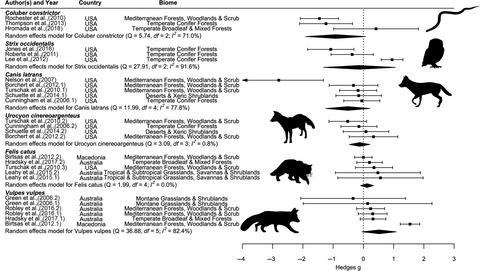当前位置:
X-MOL 学术
›
J. Anim. Ecol.
›
论文详情
Our official English website, www.x-mol.net, welcomes your
feedback! (Note: you will need to create a separate account there.)
Predator responses to fire: A global systematic review and meta‐analysis
Journal of Animal Ecology ( IF 3.5 ) Pub Date : 2020-04-01 , DOI: 10.1111/1365-2656.13153 William L Geary 1, 2 , Tim S Doherty 1 , Dale G Nimmo 3 , Ayesha I T Tulloch 4 , Euan G Ritchie 1
Journal of Animal Ecology ( IF 3.5 ) Pub Date : 2020-04-01 , DOI: 10.1111/1365-2656.13153 William L Geary 1, 2 , Tim S Doherty 1 , Dale G Nimmo 3 , Ayesha I T Tulloch 4 , Euan G Ritchie 1
Affiliation

|
Knowledge of how disturbances such as fire shape habitat structure and composition, and affect animal interactions, is fundamental to ecology and ecosystem management. Predators also exert strong effects on ecological communities, through top-down regulation of prey and competitors, which can result in trophic cascades. Despite their ubiquity, ecological importance and potential to interact with fire, our general understanding of how predators respond to fire remains poor, hampering ecosystem management. To address this important knowledge gap, we conducted a systematic review and meta-analysis of the effects of fire on terrestrial, vertebrate predators worldwide. We found 160 studies spanning 1978-2018. There were 36 studies with sufficient information for meta-analysis, from which we extracted 96 effect sizes (Hedge's g) for 67 predator species relating to changes in abundance indices, occupancy or resource selection in burned and unburned areas, or before and after fire. Studies spanned geographic locations, taxonomic families, and study designs, but most were located in North America and Oceania (59% and 24%, respectively), and largely focussed on felids (24%) and canids (25%). Half (50%) of the studies reported responses to wildfire, and nearly one third concerned prescribed (management) fires. There were no clear, general responses of predators to fire, nor relationships with geographic area, biome or life history traits (e.g. body mass, hunting strategy and diet). Responses varied considerably between species. Analysis of species for which at least three effect sizes had been reported in the literature revealed that red foxes (Vulpes vulpes) mostly responded positively to fire (e.g. higher abundance in burned compared to unburned areas) and eastern racers (Coluber constrictor) negatively, with variances overlapping zero only slightly for both species. Our systematic review and meta-analysis revealed strong variation in predator responses to fire, and major geographic and taxonomic knowledge gaps. Varied responses of predator species to fire likely depend on ecosystem context. Consistent reporting of ongoing monitoring and management experiments is required to improve understanding of the mechanisms driving predator responses to fire, and any broader effects (e.g. trophic interactions). The divergent responses of species in our study suggest that adaptive, context-specific management of predator-fire relationships is required.
中文翻译:

捕食者对火灾的反应:全球系统评价和荟萃分析
了解火灾等干扰如何塑造栖息地结构和组成,以及如何影响动物相互作用,是生态和生态系统管理的基础。捕食者还通过对猎物和竞争者的自上而下调控,对生态群落产生强烈影响,这可能导致营养级联。尽管它们无处不在,生态重要性和与火相互作用的潜力,但我们对捕食者如何应对火的一般理解仍然很差,阻碍了生态系统管理。为了解决这一重要的知识差距,我们对火灾对全球陆地脊椎动物捕食者的影响进行了系统回顾和荟萃分析。我们发现了 1978-2018 年的 160 项研究。有 36 项研究有足够的信息进行荟萃分析,我们从中提取了 96 个效应量(Hedge' sg) 用于 67 种捕食者物种,这些物种与燃烧和未燃烧区域或火灾前后的丰度指数、占有率或资源选择的变化有关。研究跨越地理位置、分类家族和研究设计,但大多数位于北美和大洋洲(分别为 59% 和 24%),并且主要集中在猫科动物(24%)和犬科动物(25%)。一半(50%)的研究报告了对野火的反应,近三分之一的研究涉及规定(管理)火灾。捕食者对火没有明确的一般反应,也没有与地理区域、生物群落或生活史特征(例如体重、狩猎策略和饮食)的关系。物种之间的反应差异很大。对文献中报告了至少三种影响大小的物种的分析表明,赤狐 (Vulpes vulpes) 对火的反应大多是积极的(例如,与未燃烧的地区相比,燃烧的地区的丰度更高)和东部赛马人(Coluber constrictor)的消极反应,与两个物种的方差仅与零略有重叠。我们的系统回顾和荟萃分析揭示了捕食者对火的反应存在很大差异,以及主要的地理和分类知识差距。捕食者物种对火灾的不同反应可能取决于生态系统环境。需要对正在进行的监测和管理实验进行一致的报告,以提高对驱动捕食者对火的反应的机制以及任何更广泛的影响(例如营养相互作用)的理解。
更新日期:2020-04-01
中文翻译:

捕食者对火灾的反应:全球系统评价和荟萃分析
了解火灾等干扰如何塑造栖息地结构和组成,以及如何影响动物相互作用,是生态和生态系统管理的基础。捕食者还通过对猎物和竞争者的自上而下调控,对生态群落产生强烈影响,这可能导致营养级联。尽管它们无处不在,生态重要性和与火相互作用的潜力,但我们对捕食者如何应对火的一般理解仍然很差,阻碍了生态系统管理。为了解决这一重要的知识差距,我们对火灾对全球陆地脊椎动物捕食者的影响进行了系统回顾和荟萃分析。我们发现了 1978-2018 年的 160 项研究。有 36 项研究有足够的信息进行荟萃分析,我们从中提取了 96 个效应量(Hedge' sg) 用于 67 种捕食者物种,这些物种与燃烧和未燃烧区域或火灾前后的丰度指数、占有率或资源选择的变化有关。研究跨越地理位置、分类家族和研究设计,但大多数位于北美和大洋洲(分别为 59% 和 24%),并且主要集中在猫科动物(24%)和犬科动物(25%)。一半(50%)的研究报告了对野火的反应,近三分之一的研究涉及规定(管理)火灾。捕食者对火没有明确的一般反应,也没有与地理区域、生物群落或生活史特征(例如体重、狩猎策略和饮食)的关系。物种之间的反应差异很大。对文献中报告了至少三种影响大小的物种的分析表明,赤狐 (Vulpes vulpes) 对火的反应大多是积极的(例如,与未燃烧的地区相比,燃烧的地区的丰度更高)和东部赛马人(Coluber constrictor)的消极反应,与两个物种的方差仅与零略有重叠。我们的系统回顾和荟萃分析揭示了捕食者对火的反应存在很大差异,以及主要的地理和分类知识差距。捕食者物种对火灾的不同反应可能取决于生态系统环境。需要对正在进行的监测和管理实验进行一致的报告,以提高对驱动捕食者对火的反应的机制以及任何更广泛的影响(例如营养相互作用)的理解。











































 京公网安备 11010802027423号
京公网安备 11010802027423号